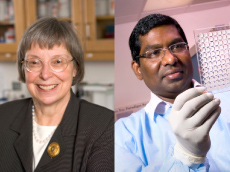
Eric Hunter, PhD
As the AIDS Vaccine 2009 conference concluded today in Paris with more than 1,000 scientists in attendance, Eric Hunter, PhD, co-director of the Emory Center for AIDS Research (CFAR) and a Georgia Research Alliance Eminent Scholar, accepted the “hand over†for next year’s international conference in Atlanta.
The Emory CFAR will serve as local Atlanta host of AIDS Vaccine 2010, which takes place next Sept. 28 to Oct. 1, led by the Global HIV Vaccine Enterprise. The conference will bring scientists, community advocates, funders and policy makers from around the world to Atlanta to hear cutting edge scientific results, exchange new ideas, educate future leaders and engage a diverse group of scientists in the quest for an AIDS vaccine.
A number of Emory scientists were in attendance in Paris at AIDS Vaccine 2009. Hunter was interviewed by several news organizations, including the Lehrer News Hour and Science magazine, about the results of a recently concluded AIDS vaccine trial conducted by the United States and Thailand. The complete results of the trial were released at the meeting and also published online this week by the New England Journal of Medicine.
Hunter was among 22 scientists who initially had criticized the trial in a 2004 Science editorial. After seeing the full results and analysis of the trial this week, Hunter commented from the Paris meeting:
“The complete data from the trial indicate that it was modestly effective in preventing HIV-1 infection. However, it will likely be difficult to establish the mechanism by which the vaccine protected participants and additional studies will be needed. This positive result, though, gives a much needed boost to efforts aimed at developing an HIV-1 vaccine and takes the field from the position of perhaps an impossible goal to a possible goal.â€
Hunter will chair AIDS Vaccine 2010 in Atlanta, along with co-chairs James Curran, MD, MPH, dean, Rollins School of Public Health; Carlos del Rio, MD, Hubert professor and chair of the Hubert Department of Global Health, Rollins School of Public Health; and Harriet Robinson, PhD, senior vice president of research and development, GeoVax and emeritus professor of microbiology and immunology, Yerkes National Primate Research Center, Emory University.
Posted on
October 22, 2009 by
admin
in Uncategorized








